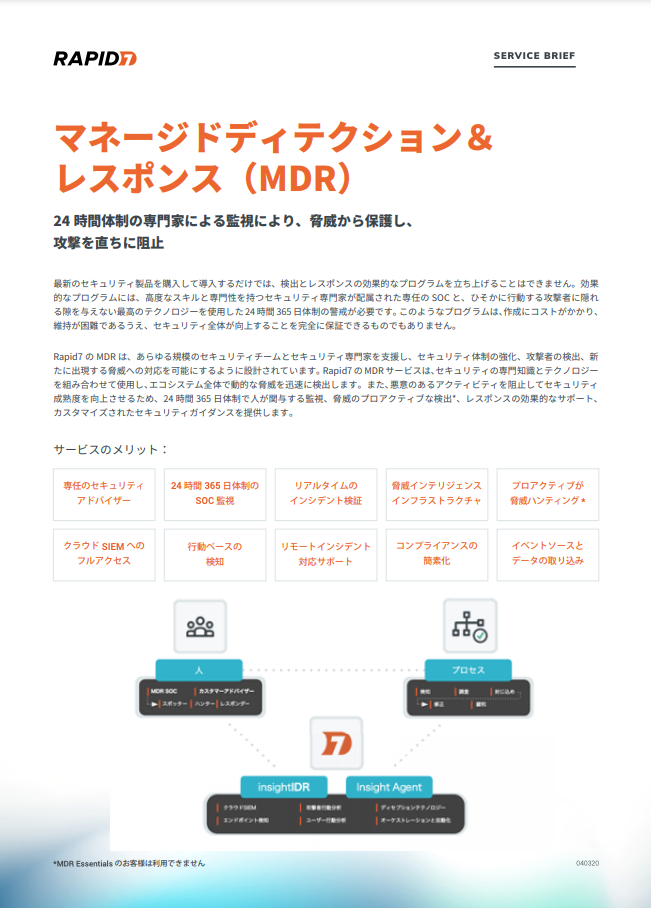Think candidly about your security team for a second. (Don't worry, our lips are sealed—we're only inside your head, anyway.) Can they thoroughly investigate every alert they receive? Could they reliably detect a penetration test... right now? If you're shaking your head, don't worry. It's not your team, it's your incident detection and response solution. And there's a better option.
See, traditional incident detection solutions only alert on IP addresses, which makes it really hard to retrace the users and activity behind the alert. Without context, every alert requires tedious threat validation and scoping, not to mention some serious sleuthing to piece together a complete story. Worse? Intruders love masking as employees to gain access to your network—activity not caught by traditional monitoring. No wonder stolen creds have been the top attack vector behind corporate breaches for five years (Verizon Data Breach Investigations Reports).
User Behavior Analytics (UBA), also known as User and Entity Behavior Analytics (UEBA), Security User Behavior Analytics (SUBA), and User and Network Behavior Analytics (UNBA) is different. User Behavior Analytics applies insight to the millions of network events your users generate every day to detect compromised credentials, lateral movement, and other malicious behavior.
InsightIDR 無料トライアル
UBA搭載SIEM、InsightIDRで攻撃を確実に検知するために必要なコンテキストを入手しましょう。
開始するAnalytics are good, User Behavior Analytics is better
Analytics is an overused and oftentimes confusing term, especially when viewed in a security context. At its core, analytics solutions should discover meaningful patterns and insight without requiring the end user to have a data degree or “know what they don’t know.”
User behavior analytics uncovers those patterns and insight to identify evidence of intruder compromise, insider threats, and risky behavior on your network. And since it focuses on behavior, not static indicators of threat, UBA can find attacks that bypass threat intelligence and alert on malicious behavior earlier in the attack, giving security teams the time and context they need to quickly respond. The scope of detection includes attacks that don’t use malware at all, such as phishing, compromised credentials, and lateral movement. Essential stuff, especially considering that in today's environments, users move seamlessly between IPs, assets, cloud services, and mobile devices.
How Rapid7 InsightIDR uses User Behavior Analytics to accelerate Incident Detection and Response
Say goodbye to that sinking feeling that the bad guys are still inside your environment. Rapid7 InsightIDR is the only fully integrated detection and investigation solution that combines user behavior analytics with pre-built detections and intruder traps, enabling you to detect the top attack vectors behind breaches –compromised credentials, malware, and phishing – earlier in the attack chain and from endpoint to cloud.
Why is InsightIDR so successful? We know attackers. From our red and blue team experience, including the Metasploit project, penetration testing services, and incident response services, we've gotten to know the traces attackers leave behind and ask for those sources of data. That’s why we’ve built intruder traps such as honeypots, honey users, and honey credentials, which generate unique security data and provide high-fidelity indicators of malicious activity, including network traffic scans and password guessing attempts.
By integrating with your existing network and security stack, including directly with cloud services, we help you manage your expanding machine data while providing actionable security insight. And by correlating all activity on your ecosystem to the exact users and assets involved, InsightIDR enables you to quickly validate, scope, and investigate alerts to help you get from compromise to containment, fast.
InsightIDR ups the ante on user behavior analytics solutions in three big ways:
- Detection is based on the attacker, not just math or identifying anomalies. InsightIDR detects the top attack vectors behind breaches, as well as behaviors indicative of compromise.
- It's complete ecosystem coverage in a single solution. We provide deep coverage and integrations from endpoint to cloud, so you can spend less time retracing user activity, digging through disparate log files, and flipping through point solutions.
- You can forget about your growing security data. InsightIDR’s secure cloud architecture means you don’t have to worry about or maintain your growing security data. And by automatically correlating all activity to the users and assets behind them, investigations and searches across that dataset are fast and painless. We can help you with nearly all SIEM solutions, ranging from log management to compliance reporting.
Best of all, you’ll no longer have to manage hardware and tune detection rules to find attacks.

